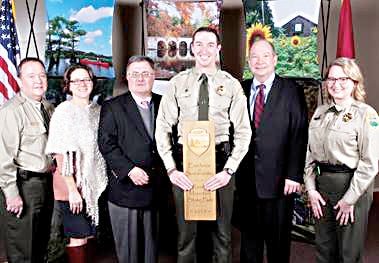Roan Mountain State Park wins sustainability award
Published 10:08 am Wednesday, February 3, 2016

Contributed Photo
(From left) Tennessee State Parks Director of Operations Mike Robertson, Program Manager in Office of Sustainable Practices Kathy Glapa, TDEC Commissioner Bob Martineau, Roan Mountain State Park Manager J.R. Tinch, Deputy Commissioner for Parks and Conservation Brock Hill and East Tennessee Area Manager Robin Wooten
Roan Mountain State Park was one of only two of the Tennessee’s 56 state parks to receive recognition for Excellence in Sustainability.
The Tennessee Department of Environment and Conservation created this award to recognize parks that exceed expectations out of a commitment to bettering their parks and communities.
“Parks nominated for this award have demonstrated exceptional sustainability measures throughout their park or within a specific operation of the park,” said TDEC Communications Director Kelly Brockman. “Sustainability includes a wide variety of activities, including but not limited to: energy conservation, recycling, waste reduction, water conservation, local purchasing, reduction in consumption, reuse, organic and native gardening, use of recycled products, reduction of chemicals, and more.”
RMSP has recycled 140 pounds of cardboard, paper, plastic and aluminum since February of 2015 as part of its “Go Green with Us” initiative. Park Manager J.R. Tinch said they had been recycling for years before the initiative began to record pounds of recycled materials. The park also recycles printer ink cartridges and has recycling receptacles in the campground and cabin area, offices, conference center and visitor center.
But recycling is just the tip of the iceberg when it comes to the park’s ongoing sustainability efforts, Tinch said. The park staff has installed energy-efficient light bulbs throughout the whole park, which will lower utility bills and help to conserve energy, Tinch added.
Additionally, in 2014, the park converted 10 acres to native grass and wildflower fields, which Tinch said eliminates the need for mowing in those areas, provides natural vegetation and reduces greenhouse gas emissions. Park staff also spend certain days throughout the year doing invasive plant removal, which helps to preserve the natural landscape.
Other efforts to improve energy efficiency include upgrading the HVAC systems in the conference center and in some ranger residences, as well as some insulation and electrical upgrades.
“The key to this upgrade was having the knowledge to look into upgrading the building envelope in tandem with the HVAC upgrade,” said Brockman. “This increases the overall efficiency within the residence and offers the best long term savings, both from utility and maintenance costs.”
Tinch said they are working with the Office of Sustainability to determine more ways that they can reduce, conserve and be more energy efficient with everything from light bulbs to emissions.
“If our department is Environment and Conservation, we need to be conservation-minded to help protect and preserve,” said Tinch. “If we can do it, maybe other businesses and organizations will follow suit.”




